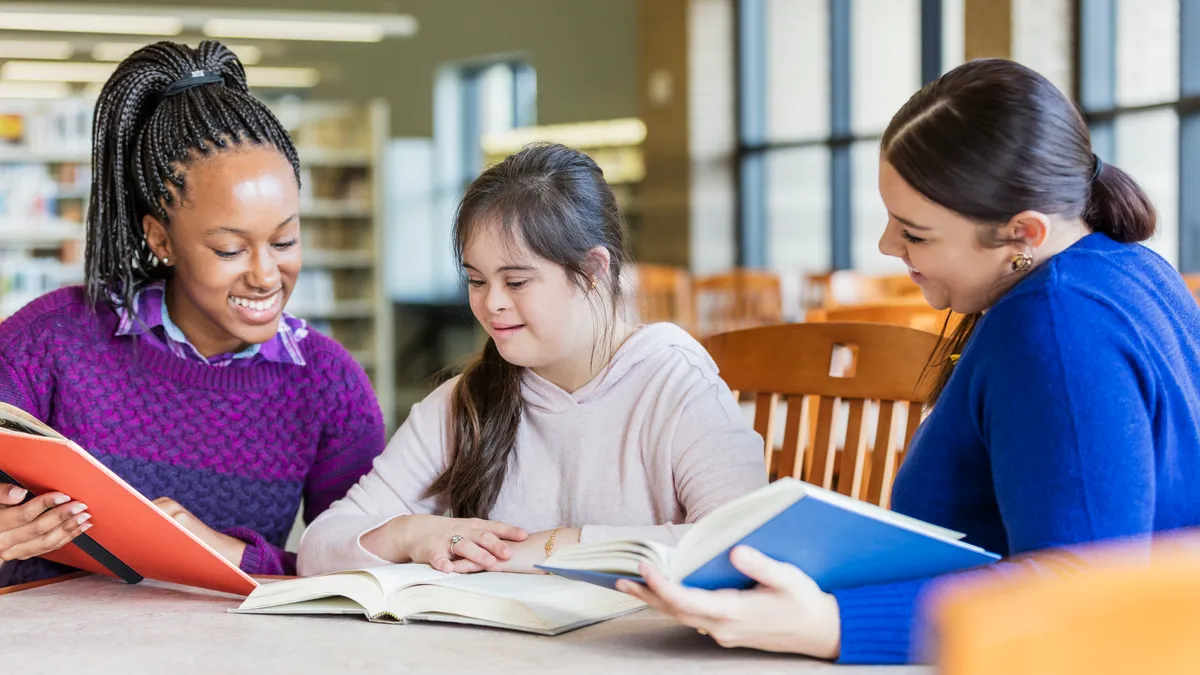Dive Brief:
- Because of their autonomy, charter schools can create more sustainable teaching and learning systems for students with disabilities, according to a new study from the Center for Learner Equity, a nonprofit that advocates for inclusivity and equity for students with disabilities in public schools.
- Including students with disabilities in general education, creating a rigorous hiring process and emphasizing teacher retention were the most impactful factors for student success, according to 59 interviews researchers conducted with school leaders, teachers, parents, technical assistance providers and paraprofessionals at 16 charter schools and six charter management organizations.
- The study suggests balancing autonomy and accountability, given that charter schools are allowed greater flexibility to explore new educational strategies in exchange for closer scrutiny of outcomes. Participating schools in the study had the most impact when using a combination of strategies rather than a single solution.
Dive Insight:
“Students with disabilities experience systematic opportunity gaps and profound inequities in their schooling experiences, across all types of public schools,” said Lauren Morando Rhim, CLE co-founder and executive director, in a statement. “Our new report finds that charter schools can help to close these gaps by investing in the systems that make inclusive educational practice sustainable over the long term.”
One such system is the creation of a rigorous hiring process. Teachers who were interviewed for the study described how their hiring committees had asked direct questions about their approach to educating students with disabilities and brought up role-play scenarios to assess them.
These exercises can help determine how teachers adapt their instruction to students’ learning needs and whether general education teachers view students with disabilities as someone else’s responsibility, according to the study.
In a more specific hiring example, Explore Excel, a school in Brooklyn, New York, prioritized candidates who work and live in the same communities as the students who attend the school. Other tactics recommended by the study include requiring demonstration lessons in the hiring process.
The research also emphasized the importance of teacher retention. Valuable retention practices that were identified include providing plenty of professional development opportunities and personal support, so hired teachers can become part of a common culture and focus on underserved students.
The study found that focusing on retention can help address the shortage of qualified candidates by creating that expertise internally. Participating leaders invested in thorough professional learning programs for new and established teachers, as well as robust new teacher onboarding programs.
The study found the most successful schools also integrated special education programming within general education. Some ensured this mix by allowing all students access to remedial and accelerated content, regardless of whether they qualified for special education services, as well as incorporating co-teaching for all core instructional courses.
According to a previous report from CLE on key trends in special education in public schools, students with disabilities in charter schools are significantly more likely than their peers in traditional public schools to spend 80% or more of their time in general education settings alongside non-disabled classmates.
Tapestry Public Charter School in Atlanta, Georgia, shifted to a block schedule and added two hours each day for staff collaboration, instructional planning and individualized education program development, the study said. This allowed special and general education teachers to work alongside therapists, behavioral specialists and other service providers.
Overall, the report recommends that schools assess their own improvement areas to create deliberate opportunities for general and special education staff to collaborate and access common professional support.






 Dive Awards
Dive Awards



